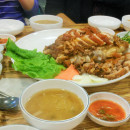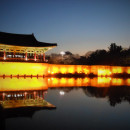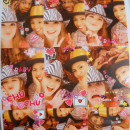Memories that will stay with you forever Past Review
By Katherine Y (East Asian Studies., The University of Texas at Austin) - abroad from 08/15/2014 to 12/21/2014 with
CIEE: Seoul - Arts and Sciences
I feel like anyone who visits and lives in a foreign country will tell you that their experiences are well worthwhile; it's hard to even express how my experience has impacted my life. I learned how it felt like to be an outsider and a minority, and be a different sort of member in a different sort of society. I discovered some weaknesses and strengths in both Korea's and my own culture and I felt like this sort of put everything into perspective.
Review Photos



Personal Information
| How much international exposure did you have prior to this program? | None |
Review Your Program
|
* Overall educational experience
Academic rigor, intensity, resources, etc. |
The language program here is fairly intensive and I felt like I was challenged a lot more than when I was back at my home university. However, the standard study abroad courses I felt were almost high-school level and not challenging at all. CIEE provided some resources like study halls or cultural reimbursement though if you need any help with learning Korean or wanting to do some exploring into other cultural things not included in the program. |
|
* Host Country Program Administration
On-site administration of your program |
The CIEE staff was always available for answering questions or providing resources. You could definitely get close to them and become personable, and they were always looking out for new opportunities for students to explore. |
|
* Housing:
How satisfied were you with your living arrangements? |
You can choose to live in SK Global House, a really nice international dorm, or you can now choose a home-stay option. CIEE didn't have the home-stay option for the full semester when I was going through my program (only weekend home-stays), but now they are doing full semester-long home-stays if you choose to do that. The international dorm is right next to all of the study abroad courses' usual class locations, so it's super convenient. There's also two cafes, some restaurants, a convenience store, and couple of cafeterias downstairs if you need anything and just want to bum around for a day. The staff at SK Global House is really friendly and you can ask them to help you out with calling taxis or ordering food if you don't know Korean and they will be happy to help you out. |
| * Food: |
Food is not included in the CIEE program fee except for the few excursions and get-togethers planned. But the food in South Korea is amazing and there is a great variety for you to choose from. If you get tired of Asian food, there is always an international option for you to choose from since there are restaurants everywhere. You might not be able to find many fruits except for apples, bananas, and tangerines though since they are pretty expensive. |
|
* Social & Cultural Integration:
How integrated did you feel with the local culture? |
I personally went to Korea with a lot of Korean language down my sleeve because I had been learning it for 4 years, so I had an advantage over some of the other students. However, many Koreans aren't used to foreigners still and I did get some stares or a feeling that I was being hypersexualized and put on a pedestal quite a bit. Random people would ask me if they could have a photo with me on the street or would just come up to me and try to practice their English, so it's a little hard to feel like you belong when you are given special treatment and always called a foreigner. The times when I felt really like I was integrated were when I volunteered at a school and got to exchange my culture with the students and teachers. |
|
* Health Care:
How well were health issues addressed during the program? |
There is a hospital literally on campus and it's supposedly the "Best and the First" hospital in all of Korea, called Severance Hospital. During CIEE's orientation you go to this hospital and become familiar with the process in case of an emergency and you get a presentation from Dr. John Linton on things to be wary of and how to avoid risky behaviors. I personally didn't get sick or have to visit a doctor, but I felt very secure and knew exactly what to do in case anything did arise because of this. |
| * Safety: |
There are a lot of drunk people at night in the busy parts of town known for clubbing and bars like Hongdae and Sinchon, and foreigners do kind of have a reputation for being more "loose" and free to express their sexuality. For the most part they are harmless, but it's best to avoid them if they stare or try to confront you. If you are a lady I would be especially careful at night, just like any other place in the world. Even at 6:30 A.M, with the sun up, I was walking alone and this man asked if I wanted to go home with him after he followed me in his car for a whole block. Women need to be very careful during these times, but for the most part I felt super safe in Seoul. I felt like I could do a lot of traveling alone in the day time. I would also be very aware of where the cars on the road are because sometimes they like to drive on the sidewalk or go down the wrong side of the street. |
| If you could do it all over again would you choose the same program? |
Yes
|
Finances
|
* Money: How easily were you able to live on a student's budget?
(1 = not very easy/$200+ on food & personal expenses/week, 2.5 = $100/week, 5 = very easily/minimal cost) |
Personally, I didn't really manage my finances very well because there was always something new to do and always something new to buy or always some sort of new food to to try. These new things can add up and get kind of costly. |
| Not including program expenses, about how much money did you spend on food and other expenses each week? | $200 |
| Do you have any general money-saving tips for future study abroad participants? | Open up a Korean bank account so that you don't get charged a three dollar fee every time you want to take out money from an ATM. You need a lot of cash when you are out, so go ahead and save yourself the hassle and open up a Korean bank account at Woori Bank on campus. |
Language
| * Did your program have a foreign language component? | Yes |
|
How much did the program encourage you to use the language?
0 = No encouragement, 5 = frequent encouragement to use the language |
This program was 2 hours everyday 5 days a week, and it included a lot of speaking and writing practice. |
| How would you rate your language skills at the beginning of the program? | Intermediate |
| How would you rate your language skills at the end of the program? | Intermediate |
| How many hours per day did you use the language? | |
| Do you have any tips/advice on the best ways to practice the language for future study abroad participants? | Get involved in some volunteer opportunities or try to do a homestay option. |
Other Program Information
|
* Where did you live?
Select all that apply |
|
|
* Who did you live with?
Select all that apply |
|
|
* Who did you take classes with?
Select all that apply |
|
| About how many local friends did you make that you will likely keep in touch with? |
A Look Back
| * What did you like most about the program? |
|
| * What could be improved? |
|
| * What do you know now that you wish you knew before going on this program? | You have to decide for yourself how you are going to make your study abroad program count. Make sure that you make an effort from the very beginning to get things done on your list, because before you know it, time will run out. |
Reasons For Studying Abroad
| To help future students find programs attended by like-minded individuals, please choose the profile that most closely represents you. |
The Nearly Native or Trail BlazerCraving the most authentic experience possible, perhaps you lived with a host family or really got in good with the locals. You may have felt confined by your program requirements and group excursions. Instead, you'd have preferred to plan your own trips, even skipping class to conduct your own 'field work.' |








